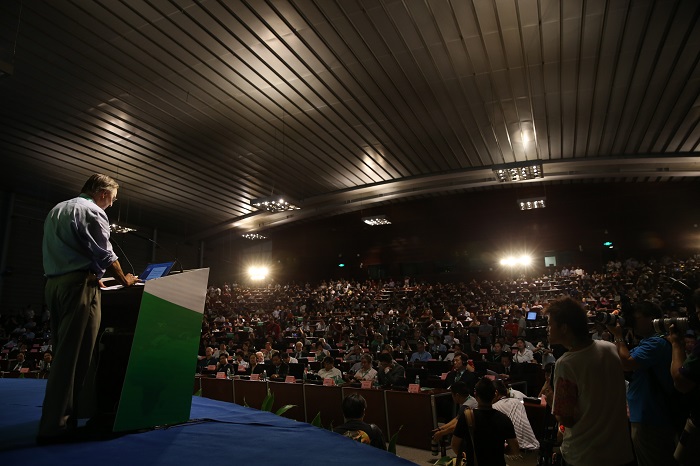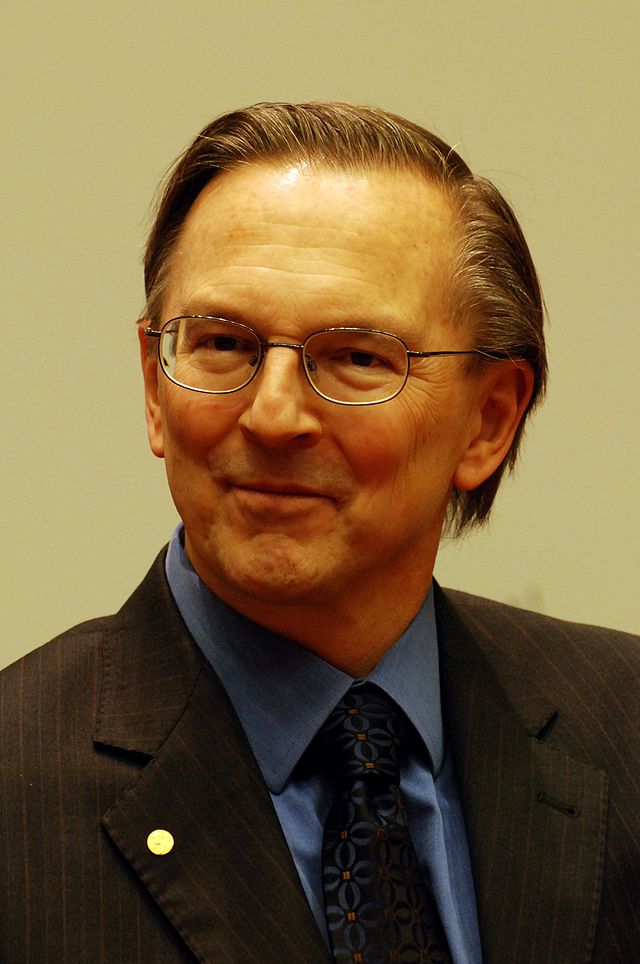2014年深圳BT领袖峰会今天正式开幕,峰会以“前瞻生物经济,把握发展趋势”为主题,通过召集国内外学术、产业、政策、金融界等领袖,共同研究国内外生物技术和产业转化中的热点问题,包括大健康产业时代的机遇和挑战、生物医疗、生命健康产业发展的趋势、BT与IT的融合发展等话题,并探讨加快生物和生命健康产业发展的政策措施,为促进全球生物科学、技术和产业发展搭建学术交流、产业合作、政策研讨的综合性平台,为各领域专家及代表提供决策参考和行业发展趋势预判。

BT峰会有幸邀请到2009年诺贝尔生理学或医学奖获得者杰克•绍斯塔克做开幕主题演讲。杰克·绍斯塔克(Jack William Szostak),美国生物学家、霍华德·休斯医学研究所研究员、哈佛医学院遗传学教授、麻省总医院亚历山大·里奇杰出研究员。他与伊丽莎白·布莱克本和卡罗尔·格雷德因为“发现端粒和端粒酶如何保护染色体”而一起获得2009年诺贝尔生理学或医学奖。

以下为诺奖得主杰克·绍斯塔克BT领袖峰会主题演讲摘要:
早上好!首先我想要感谢主办方,感谢组委会,感谢深圳市人民政府和中国医药技术协会,特别想要感谢深圳市长、副市长先生,还有王荣书记先生,很感谢我这个机会来到深圳,并且有机会来到这里见到这么多的专家。我认为深圳非常有活力,而且这次峰会能够给我们带来很大的机会,让我们能够更好地学习到生物科学和生物技术,目前生物技术已经到了变革的时代,能够为人们的健康带来变革性的进展。
我跟生物科技到底有什么关联呢?我的事业大部分都是包含在非常基础的学术研究方面,但同时我在生物技术以及医药行业当中大概有30多年的经验。我们的基础研究最重要的也是比较实用性的,能够促进生物医药发展的研究。其次我给很多公司做咨询和顾问的工作,我也和很多医院有相关的往来,做了大量的临床医学。我再次感谢主办方给予我这个机会和大家分享我的经验。
之前大会想让我探讨一下学术方面以及生物技术产业链之间的关系,包括所有的投资主体,大型医药公司和知识产权等方面的问题。因为我是在星期一的时候到了波斯顿,可以说我是今天凌晨3点钟才躺到床上,而且时差的问题让我无法入睡,我就在想要讲什么。既然这么着急,我就要想办法把这个演讲讲得更有创意。如果你们把一个人最后一分钟请到大会上,他就想试试更有意义的东西,我今天想谈科学和艺术的关系。我想到讲这一点,主要是由于我和同事在合成有机化学领域上遇到的挑战。当我画一个非常简单的生物分子的图形的时候,比如核苷酸,我改变其中一个原子,有的时候就算最伟大的化学家也没有办法告诉我这个新的分子会是怎么样的。他们不会告诉你正确的做测序的顺序是什么,有的时候要花几个月的时候,甚至一年的时间,经过无数的错误,再进行优化,最后得到一个可接受的分子形式。所以当化学家告诉我们,如果合成有机化学已经是一个成熟的技术了,不可能,在这个过程中需要用到你艺术的天分,你需要想办法找到最合适的方式,甚至可以搜集到很多信息。比如有几千万的化学反应,在这个情况下人们并没有了解这个知识,我们在设计这个分子的时候,必须要想办法做得更好。所以我在这边主要跟大家讲的是在某些方面,我认为生物技术也是一样的,而且如果我们要做一个新的治疗技术的话,这是很复杂的,这需要我们通过很多我们所不了解的知识,就像是我们研发出一种新药,这也是一种技术,这需要生物知识,还需要我们的直觉,这包括你对分子成分的直觉。生物技术我们好像已经了解了很多,其实我们还有很多东西不了解,现在包括基因组学,以及如何制造分子,以及如何把分子整合,所有这些反应,而且我们可以做任何我们想要做的抗体,能够把我们任何想要做的目标分子整合起来,我们能够做多肽,但这远远不够,因为这对我们来讲,我们已经知道了这些重要的信息。在过去来讲,这都是史无前例的,但我们了解够了吗?不够,这就是为什么我们在研发新药方面遇到的挑战。
我们不知道大部分人类基因的作用,我们不知道这些基因是怎么运作的,我们不知道遗传学是怎么样正确产生影响的,有的时候我们真的不知道如何在正确的时候把药品打到人体正确的部位,还有一些副作用我们也不知道。说到免疫系统,我们在抗癌治疗方面已经有最大的成就了,但我们仍然需要经过几十年的时间,让我们在分子基因组学上面做得更好。这是我们未来的挑战,我们需要更加努力,帮助我们研发出新的工具,研发出新药。在今天我们必须把所有的信息整合起来,而且能够把这些看上去似乎毫无关联的知识整合起来,并且在这些方面用到我们的艺术天分,用我们的直觉大胆地尝试,大胆地创新,而且希望我们能够更好地把所有的合成分子整合起来,让它成为最好的成果。而且就今天来讲,我们必须能够更好地检验一个病人,能够更好地收集有效的信息,做出正确的诊断,能够优化我们诊断的程序,优化我们的治疗程序。所以我同意在生物技术中我们是科学家,我们也是艺术家,感谢各位的聆听!
I would like thank the organizing committee of the Shenzhen Biotech Leaders Summit, and especially the Vice-Mayor of Shenzhen City and the Director of SIAT for giving me this opportunity to visit Shenzhen for the first time, and to meet with so many interesting people. I am impressed with the dynamic atmosphere, and am looking forward to an exciting conference. We’re all very privileged to be participating in the advances in Biotechnology that are beginning to revolutionize health care.
Now, you may have noticed that I am not Sydney Brenner, who was originally scheduled to present this Keynote address. Unfortunately he is in ill health and, and was unable to travel here. I know we are all wishing him a speedy recovery; he is certainly one of the world’s greatest biologists and always a pleasure to talk to, and I am very sorry he can’t be here with us.
So, you may be asking yourselves, who is this person talking to us? He has a NP, but what is his connection to Biotech? It is true that my career has been mostly in very fundamental academic research, but at the same time I have had long and varied experiences with Biotech and Pharma, including such biotech companies as Genetics Institute, Transkaryotic Therapies, Gilead Sciences, Cubist, Phylos, Ra, Moderna, and Elysium and the Pharma company Hoechst, which became Aventis. I thank the organizers again for opportunity to share some of my experiences and insights.
Now, my original plan, when I was asked at the last minute to step in for Sydney, was to give a straight talk - to discuss the interactions between the Biotech industry and Academia, the investment community, Big Pharma and the legal IP community. However, having come in from Boston on Monday, I am completely jet lagged. As a result, I was lying awake last night at 3 PM, unable to fall back asleep, because while I know what time it is, my body certainly does not. And while I was thinking, it occurred to me that I could try something more creative than my original plan - and so, yes, I am could do an experiment here, with you as the subjects, and throw out my straight talk and try something different. Well, that’s what happens when you pull in a jet lagged speaker at the last minute.
What I am going to do is to talk about Science and Art. I would bet that most of you think of yourselves as scientists, or at least in the business of Science. But what I would like to say is that there is a large component of Art in what we do, and that we need to recognize this and encourage this aspect of our work. So, why do I say this?
This idea actually came from my frustration with my colleagues in the field of synthetic organic Chemistry. I am a Professor of Chemistry at Harvard University, and in that Chemistry Department are some of the world’s greatest synthetic organic chemists, including the Nobel Prize winner EJ Corey. Now these people are brilliant, don’t get me wrong, and they display that brilliance by showing us, again and again, that they can synthesize any complicated molecule that Nature can test them with. They can dissect the most complicated natural products, down to tiny pieces, and put the pieces back together again in remarkably creative synthetic pathways.
But, and this is what frustrates me, is that when I draw a simple biological molecule, such a nucleotide, and change one atom, usually, despite all this information and expertise and experience, they can’t tell me how to make the new molecule! It can take months or even a year of trial and error and optimization to come up with an acceptable process. So, when chemists tell me the synthesis is a mature science, I say no, it isn’t - its an art form. You need intuition and experience and creativity to find these pathways, and even though we have a lot of information about thousands of reactions, we don’t have the level of understanding, the knowledge, that would let us look at a molecule, and design an optimal synthesis, and then make the molecule the same day.
Now my point is, that in some respects Biotechnology is the same. I suggest that the development of new therapeutics is so complex and one has to find a path through so many unknowns, that the development of a new drug is more like art than science - in the sense that it takes a sort of biological intuition to make progress when we know both so much and so little. Now you may say that we know so much more now than ever before - we know our genome sequence and the sequence of every pathogen, we know how to fabricate molecules that will bind anything and block any interaction and so on. We can make any antibody you want, to bind to any target molecule you want. We can make peptides, and aptamers and siRNAs and so on. But that’s not enough. Certainly it is true that we have orders of magnitude more information than ever before in the history of science - but do we have that much more understanding? Clearly we don’t and that is why is it still so hard to develop new drugs. Consider what we don’t know - we don’t know what most human genes do, and we know even less about how they do it, where they do it and why; we have a hard time delivering our drugs to the right place at the right time, and we can’t predict when they go to the wrong place and lead to some toxic interaction. Take the immune system, where our growing understanding has led to the most exciting advances in cancer therapy in history - and yet despite decades of work we are still figuring out the molecular players that make these therapies work or fail. These are the challenges of the future, problems that will be and are being solved by brilliant people with fantastic new tools.
But for now we should recognize that making sense of all of this information, making connections between points that seem unrelated, in other words, intuition and creativity, are at the heart of progress. And therefore we should cultivate that more artistic side of our efforts, that artist’s ability to bring disparate influences together in surprising and beautiful new combinations, even as we aim for a more systematic approach, to that ideal of being able to examine a sick patient, collect the necessary information, make a correct diagnosis and design an optimal treatment. Only when we can do that will I agree that Biotech, and Medicine in general, has become a science and is no longer an art form.
Thank you for listening.







